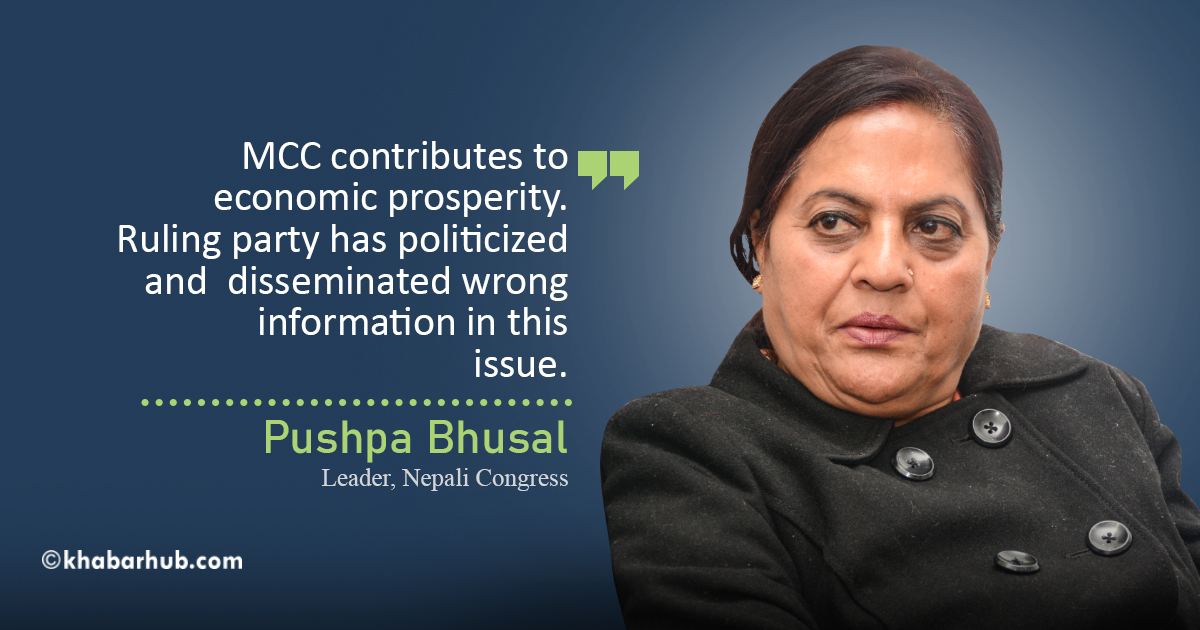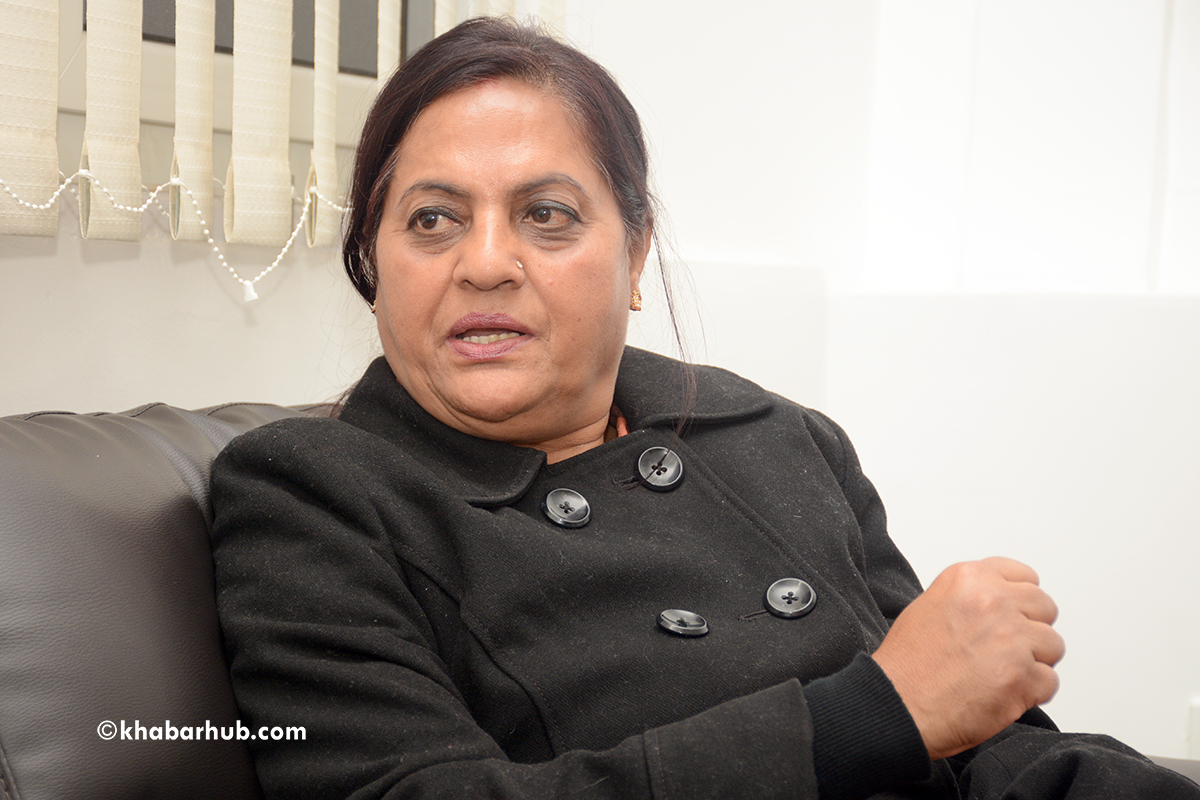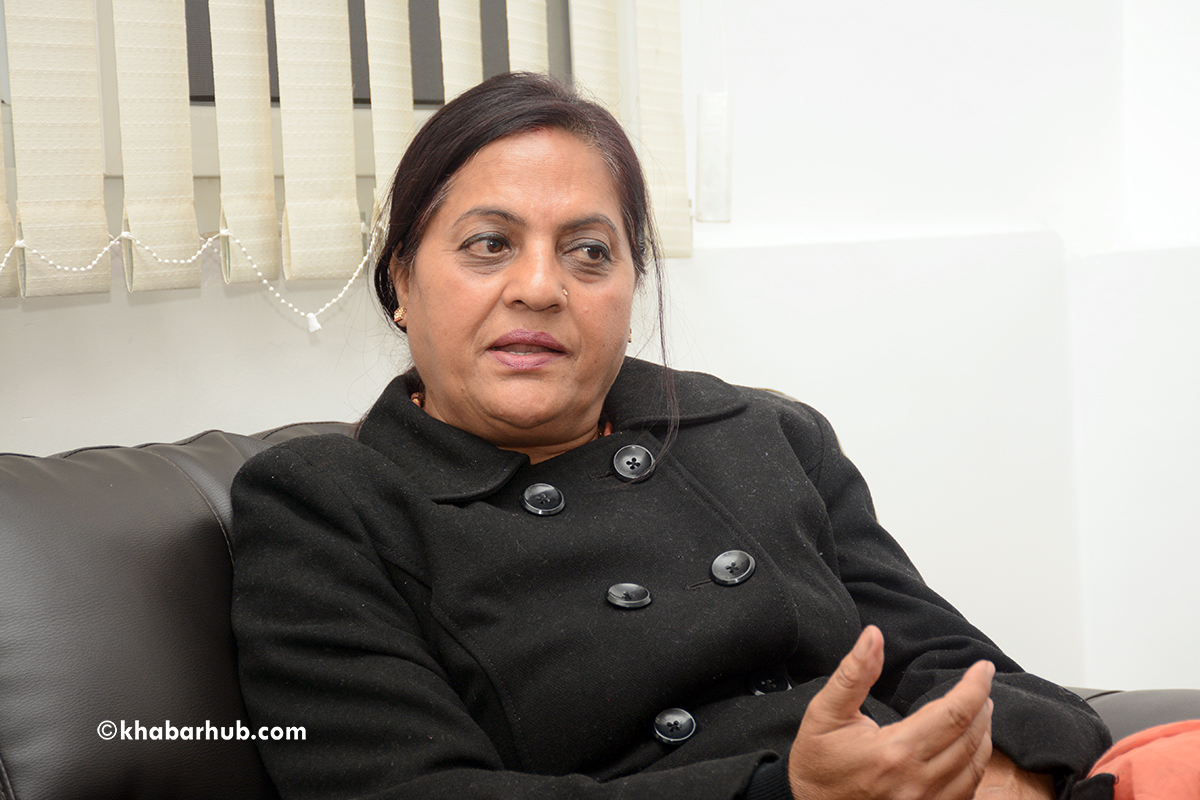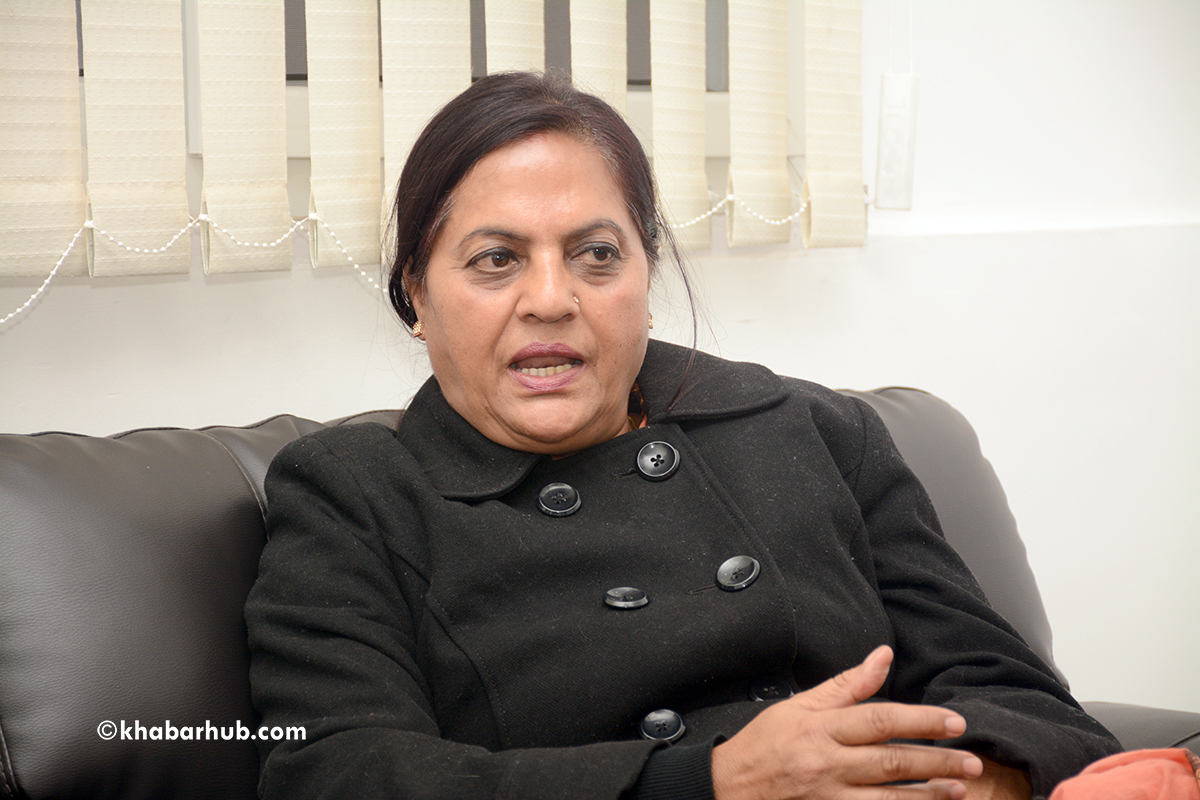0%

KATHMANDU: At a time when there has been a lot of hues and cries on the Millennium Challenge Corporation (MCC) Compact among the ruling Communist Party (NCP) leaders, the country’s main opposition party, Nepali Congress (NC), is unanimous in its position with its full-fledged support to the Compact.
NC, however, has launched a protest against the government and the Commission for the Investigation of Abuse of Authority’s (CIAA) recent move of indicting its vice-president on corruption charges. While the party has been obstructing the parliamentary proceedings, its sister organizations have hit the streets.
In such a scenario, Khabarhub approached NC leader and party whip at the Federal Parliament, Pushpa Bhusal to get an updated position of the party in two issues. Excerpts of the interview:
Nepali Congress hasn’t been so active in anti-corruption drive in the past. Now, is it trying to prove the innocence of its leader Bijay Kumar Gachchadhar in the Lalita Niwas land grab scam? Why all this mess?
Not at all. Let’s take it this way. Generally in a democracy, a party having the majority rules the country, and the main opposition becomes the major voice in the parliament. This was what we fought for.
Remember, the NC cooperated with the government in the all-party meeting called by the Prime Minister on the Kalapani issue. We gave a loud and clear message that Kalapani, Limpiyadhura and Lipu Lekh belonged to Nepal. NC President Sher Bahadur Deuba called for unity to claim the land back, and assured of the party’s utmost support to the government in every step taken in this direction.
The government should listen to the opposition party. For example, when it comes to the MCC Compact, it’s pretty clear that it is related to the nation’s economic prosperity. We, therefore, hold the view that it should be handled with utmost priority.
In issues of public or national interests, we support the government. The principle of separation of powers says the legislature, the judiciary and the executive should exercise their duties without interfering with one another. These three organs of the state should control and cooperate with each other as per the spirit of the constitution.
Our protest is not against the government but is directed towards an unfair and biased move of the CIAA, an anti-graft constitutional body.
Don’t you think that NC should maintain distance with the government as Communists are draining out the country’s resources, working in an undemocratic way, and against the spirit of the constitution?
Indeed, if we analyze the functioning of the government, it seems that it is trying to jeopardize the fundamental rights. Take for instance the proposed Media Council Bill which would curb freedom of press and publication, and the Guthi Bill, etc. The government proposed the bills that have been aimed at shrinking human rights if endorsed as they are.
The government even tried to bring the Security Council under the Prime Minister’s office. Now, take the example of IT Bill, which has been aimed at curtailing the freedom of press and publication, and suppressing the voice of opposition against the government. To be precise, the incumbent government has put the fundamentals of democracy at stake.
Despite a relatively small number of members in the parliament, Nepali Congress, as the main opposition party, is fulfilling its duty towards the Constitution, to safeguard the fundamental rights, and the rule of law at its best.

When all mechanisms of the state fall in the hands of dictators or autocrats, it’s natural that the opposing voices are silenced variously. Yet, NC has pushed the regressive steps of the government back when it comes to bills such as the Guthi Bill, Media Council Bill, etc.
In the case of federalism as well, the government has not empowered the grass-root levels in practice. In the issues related to corruption — be it the NCell issue, wide-body case, Melamchi, corruption in Budhi Gandaki project, or other issues related to the misuse of national revenue, corruption-related with the property of Nepal Trust, Nepali Congress has been raising its concern seriously. Thirdly, you talked about the Baluwatar issue.
NC has protested CIAA’s attempt to curb corruption as in the case of Lalita Niwas issue related to its leader. Don’t you think it disseminates a negative message against NC?
There are numerous cases of corruption as I said earlier. It should be emphatically noted that Nepali Congress was the party that fought to empower CIAA. NC wants to ensure impartiality and neutrality on the part of the CIAA. We want the anti-graft body to act fairly in all cases.
However, the way CIAA sued in this Baluwatar case, it made us conclude that the CIAA has failed to maintain neutrality and impartiality. The CIAA seems working under the government’s influence in the way the case is forwarded now.
As an individual with in-depth knowledge and interest in legal issues, what should have been there?
The CIAA’s latest move seems to be against NC. It seems that the person is targeted simply because he is an NC leader. Therefore, the move seems to be against the party, not an individual. Going through the issue and its history, it’s clear that our party’s Vice President, who was in the cabinet then, had taken the proposal to the cabinet for road expansion in the PM’s residential area. He had only taken the proposal.
It was later passed by the cabinet. Hence, it was a decision made by the cabinet. The CIAA seems to have pardoned others and put the blame on an individual. From the point of equity, the point of view of the rule of law, this move seems faulty and unfair.
For example, the CIAA offered an exemption to those who had acquired the land illegally and now promised to return the land. Is this fair? Can CIAA act in such a way?
In such a grave case, CIAA did not abide by the fundamentals of equity. It filed the case as if only the NC leader was solely responsible for the entire episode. When the constitutional body is influenced by the government, don’t you think that such a trend makes a mockery of constitutionalism? This is unfortunate.
Do you mean both PMs also should have been made part of the scam or CIAA should not have raised fingers at any ministers?
As you mentioned, firstly, it is essential to discuss the latest drafts and proposals to curtail the rights of the CIAA so as to make it unable to look into the abuses in the judiciary, cabinet decision, and the issues related with Nepal Army. This needs serious discussion. Secondly, provided that the provisions or laws are vague, and need further clarification, the concerned authority should bring them for discussion based on their prevalent practice and interpretation.
In this context, the way the allegations are made and the individuals are targeted while filing this case in the Special Court clearly indicate that the CIAA worked under the government’s influence. Talking about the CIAA Act, there are many things to be discussed and decided; the proposal is tabled, therefore, more discussions and the minute penetration into the clauses in the act can help in making it better and more capable.

CIAA has gone beyond its jurisprudence, rather than using the judicial conscience it has shown the bias in this issue. There are political revenge and political bias in the move.
As an advocate, how do you take the case as some people who promised to return the land acquired by abuse of power are relieved of allegations and others are charged in the same?
When I said CIAA is biased, I looked at it from the point of view of equity. This very fact makes room for growing suspicious of the CIAA move. In the past also, when some of our leaders were alleged, we said, we would abide by the court’s verdict and we did it. We do not support corruption but here, the intention behind the allegations is wrong. The CIAA, under the government’s influence, has gone beyond its jurisprudence by alleging our leader for political revenge. We, therefore, protested the move.
The case is in court now. Should a responsible opposition party with such a glorious history protest in this way?
We believe CIAA should be an honorable constitutional body. It should maintain its dignity. It’s not a commission formed by the government. It is a body expected to act freely, without government interference. When the constitutional body works under the government influence or like a ruling party’s agent, protests become essential.
When it faces problems from the very beginning, the parliament should amend the provisions to empower it so as to make it act independently. It’s not a protest against the Special Court, it’s a protest against the biased move of CIAA.
How long will a democratic party obstruct the parliament?
We have a central committee meeting on February 10. The central committee meeting and the parliamentary party will decide on it.
Do you want the CIAA to withdraw the case?
We actually want CIAA to act fairly. CIAA was biased in filing the sheet, we want it to act fairly. When constitutional bodies go beyond their jurisprudence and act this way, it creates tensions and weakens democracy as an institution.
NC seems to be lobbying for MCC strongly, The ruling party is divided on the issue. Is it to prove that NC is a staunch supporter of the US?
Not at all. The United States has many projects like the MCC. There are many US agencies offering donations. If looked at it minutely, the MCC Compact Nepal signed under the Nepali Congress government; that was done by making Nepal eligible for the grant and competing with many nations.
What needs to understand is that it’s not a loan. It’s a grant. We managed to bag it after a long procedure. MCC contributes to economic prosperity. The ruling party has politicized and disseminated the wrong information on this issue.

The MCC grant that Nepal is receiving is meant to be utilized in infrastructure building in the transmission line as well as road network expansion. The fund cannot be used in other sectors. Provided this grant goes for implementation, it should be transparent, no doubt.
One should consider, what the procedures for applying for it were and how, under the Nepali Congress-led government, Nepal managed to bag such a big grant; Nepal had never got such a grant for a single project before. The government has failed to clarify the benefits of the MCC Compact.
Instead of clarifying it, the ruling party has played a suspicious role, it has politicized the issue. The economic impact it can make for the country should have been clarified. It’s because of the government’s failure to clarify the issue, people are confused. The ruling party’s inefficiency and the dubious role has made the supporter of this project look like pro-Americans.
NC had studied the impact, it had initiated and signed the Compact. Therefore, it has to be endorsed without any delay.